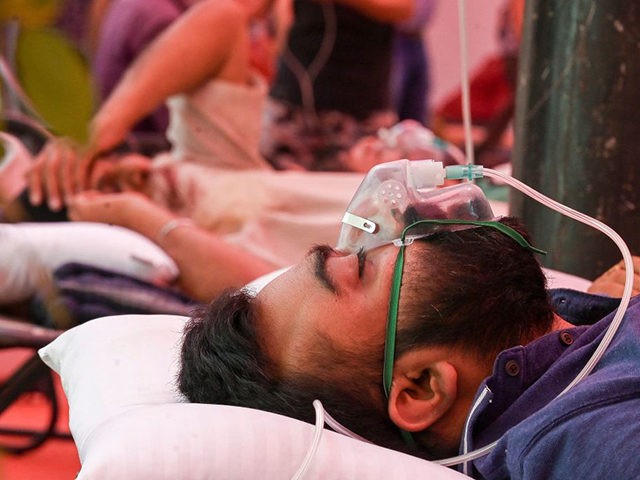The deaths of Chinese coronavirus patients due to oxygen shortages in the northern Indian state of Uttar Pradesh are “not less than a genocide,” Uttar Pradesh’s top court claimed Tuesday.
“We are at pain in observing that death of Covid [Chinese coronavirus] patients just for non-supply of oxygen to the hospitals is a criminal act and not less than a genocide by those who have been entrusted the task to ensure continuous procurement and supply chain of the liquid medical oxygen,” a bench of Justice Siddhartha Varma and Justice Ajit Kumar of the Allahabad High Court, which has jurisdiction over Uttar Pradesh, said on May 4.
The court was hearing a public interest litigation petition concerning recent reports that patients battling severe cases of the Chinese coronavirus died in the Uttar Pradesh cities of Lucknow and Meerut due to oxygen shortages. The Allahabad High Court said accounts of state-wide oxygen shortages demonstrated “harassment meted out” by district administrators and police “to those poor citizens who were begging for an oxygen cylinder to save the life of their near and dear ones,” according to the Indian Express.
The Allahabad High Court on May 4 ordered the district magistrates of Lucknow and Meerut to “inquire about the deaths in their districts within 48 hours and submit reports on the next hearing, on May 7,” according to the Times of India.
“The [Allahabad High Court] order mentioned news reports about the deaths of five patients in the Intensive Care Unit (ICU) of a new trauma center at the Meerut Medical College on Sunday [May 2] and fatalities at the Sun Hospital in Lucknow,” the Indian Express reported. “The court also mentioned reports on similar deaths in another private hospital in Meerut, where the facility took its ‘hands off,’ or stopped treating, the admitted Chinese coronavirus patients “only for the reason that oxygen supply was not made even after demand.”
“We find these news items showing a quite contrary picture to one claimed by the [Uttar Pradesh] Government that there was sufficient supply of oxygen,” Allahabad High Court said.
The U.N. definition of genocide requires the “intent to destroy” a discrete group of people, something the court did not attempt to prove in using the term. In Uttar Pradesh, hospitals are attempting to treat Chinese coronavirus patients but are simply running out of supplies while operating at or over capacity in a nation of nearly 1.4 billion people. The U.N. defines “genocide” as particular acts “committed with intent to destroy, in whole or in part, a national, ethnical, racial or religious group.” The U.N. defines the specific acts of genocide as the following:
Killing members of the group; Causing serious bodily or mental harm to members of the group; Deliberately inflicting on the group conditions of life calculated to bring about its physical destruction in whole or in part; Imposing measures intended to prevent births within the group; Forcibly transferring children of the group to another group.
India’s Chinese coronavirus caseload has surged over the past month, with the number of new daily infections and deaths from the disease pushing the country’s healthcare system to its breaking point. Police in the Indian national capital, New Delhi, began providing armed escorts for oxygen tankers in late April as they delivered fresh supplies of the scarce resource to area hospitals. New Delhi is located in the National Capital Territory of Delhi, which borders Uttar Pradesh.

COMMENTS
Please let us know if you're having issues with commenting.